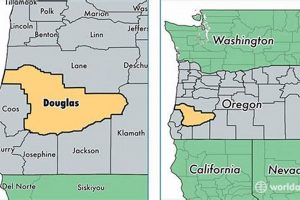The solid waste disposal facility located in Deschutes County near Bend, Oregon, serves as the primary site for the management of refuse generated within the region. This location accepts municipal solid waste, construction and demolition debris, and other approved materials from residents, businesses, and permitted haulers. Its operational procedures are governed by both state and federal environmental regulations to ensure safe and responsible waste management practices.
Properly managed landfills are critical for public health and environmental protection. They prevent the uncontrolled release of pollutants into the surrounding air, water, and soil. Furthermore, they play a crucial role in resource recovery through strategies like methane gas capture, which can be converted into energy. Historically, landfill practices have evolved significantly, driven by increasing volumes of waste and a greater understanding of environmental impacts, leading to the implementation of advanced engineering controls and monitoring systems.
The following sections will detail specific aspects of the Deschutes County waste management system, including its operational procedures, environmental safeguards, waste diversion programs, and community engagement initiatives. These components contribute to the overarching goal of sustainable waste management within Deschutes County.
Waste Disposal Best Practices
Efficient utilization of the Deschutes County landfill, near Bend, Oregon, necessitates adherence to specific guidelines that promote environmental responsibility and operational efficiency.
Tip 1: Pre-Sort Waste Materials. Segregate recyclable materials (plastics, aluminum, glass, paper) before arrival. This minimizes landfill volume and maximizes resource recovery.
Tip 2: Properly Secure Loads. Ensure all loads transported to the Deschutes County landfill are securely tarped or contained to prevent debris from scattering during transit. This minimizes litter along roadways.
Tip 3: Adhere to Material Acceptance Guidelines. Familiarize yourself with the list of acceptable and prohibited items. Certain materials, such as hazardous waste and electronics, require specialized disposal methods.
Tip 4: Maximize Load Consolidation. Compress or break down bulky items to minimize the space they occupy within the waste container and, subsequently, at the disposal site.
Tip 5: Understand Tipping Fees. Be aware of the current tipping fee schedule for various waste types and quantities. This allows for accurate budgeting and avoids unexpected charges.
Tip 6: Utilize Designated Drop-off Areas. Follow posted signage and directions to ensure proper placement of waste within the landfill. Separate areas exist for specific materials.
Tip 7: Report Illegal Dumping. If witnessing illegal dumping activity, contact Deschutes County authorities with details of the incident. This helps maintain the integrity of the environment.
Implementing these practices contributes to a more sustainable and efficient waste management system within Deschutes County. Compliance reduces environmental impact and promotes resource conservation.
The following sections will address community programs and initiatives related to waste reduction and environmental stewardship in Deschutes County.
1. Waste Acceptance Criteria
Waste Acceptance Criteria (WAC) are paramount in the operation of the Deschutes County landfill near Bend, Oregon. These criteria serve as a regulatory gatekeeper, dictating the types of waste materials that are permissible for disposal within the landfill boundaries. Adherence to WAC is critical for maintaining environmental integrity, protecting public health, and ensuring compliance with state and federal regulations.
- Prohibited Materials
The Deschutes County landfill prohibits the disposal of specific materials that pose significant environmental or operational risks. Examples include hazardous waste, radioactive materials, and certain types of liquids. These restrictions are in place to prevent groundwater contamination, air pollution, and damage to landfill infrastructure. Failure to comply with these prohibitions can result in significant penalties and remediation costs.
- Acceptable Waste Streams
Conversely, the landfill accepts various waste streams, including municipal solid waste (MSW) from residential and commercial sources, construction and demolition (C&D) debris, and certain types of industrial waste, provided they meet established criteria. The acceptance of these materials is contingent on their composition, physical characteristics, and compliance with pre-treatment requirements, where applicable.
- Pre-Treatment Requirements
Certain waste materials may require pre-treatment before acceptance at the Deschutes County landfill. This may involve processes such as stabilization, solidification, or shredding to reduce the volume, toxicity, or mobility of contaminants. Pre-treatment requirements are designed to enhance the safety and stability of the landfill environment and minimize potential long-term risks.
- Documentation and Verification
To ensure compliance with WAC, the Deschutes County landfill requires haulers and generators to provide documentation verifying the composition and characteristics of the waste being disposed. This documentation may include waste manifests, analytical testing results, and certifications. Landfill personnel conduct visual inspections and may perform additional testing to verify the accuracy of the provided information.
In summary, Waste Acceptance Criteria form a cornerstone of responsible waste management practices at the Deschutes County landfill near Bend, Oregon. By diligently enforcing these criteria, the landfill operators minimize environmental risks, protect public health, and ensure the long-term sustainability of the facility.
2. Environmental Monitoring Systems
Environmental Monitoring Systems are critical to the safe and responsible operation of the Deschutes County landfill near Bend, Oregon. These systems provide ongoing data collection and analysis, ensuring the facility operates within established environmental regulations and minimizes potential impacts to surrounding ecosystems and communities.
- Groundwater Monitoring Wells
An array of groundwater monitoring wells strategically positioned around the Deschutes County landfill serves as the primary means of detecting potential leachate contamination. These wells are regularly sampled and analyzed for a range of parameters, including pH, conductivity, heavy metals, and volatile organic compounds. The data obtained from these wells provides early warning signs of any leachate migration, allowing for timely intervention and mitigation measures. For example, an increase in conductivity levels in a down-gradient well might indicate leachate intrusion, prompting further investigation and potential remediation actions.
- Landfill Gas Monitoring
Decomposition of organic waste within the landfill generates landfill gas (LFG), primarily composed of methane and carbon dioxide. Methane is a potent greenhouse gas, and uncontrolled LFG migration can pose explosion hazards. A comprehensive LFG monitoring system continuously measures gas concentrations both within the landfill and at its perimeter. This monitoring informs the operation of LFG collection and control systems, which may include flaring or energy recovery. Exceeding established methane concentration limits triggers immediate action to identify and remediate the source of the leak.
- Surface Water Monitoring
Surface water bodies in proximity to the Deschutes County landfill are subject to regular monitoring to assess potential impacts from stormwater runoff or other discharges. Sampling and analysis include parameters such as turbidity, dissolved oxygen, and various chemical pollutants. This monitoring ensures that landfill operations do not negatively affect the water quality of nearby streams, rivers, or wetlands. For instance, elevated turbidity levels after a heavy rainfall event might indicate erosion issues within the landfill, requiring corrective measures to prevent sediment runoff.
- Air Quality Monitoring
Air quality monitoring at and around the Deschutes County landfill assesses potential emissions of volatile organic compounds (VOCs) and particulate matter. This monitoring is particularly important during landfill construction and operation phases. Data collected informs the effectiveness of dust control measures and gas collection systems in minimizing air pollution. The results are compared against regulatory standards to ensure compliance and protect the health of nearby communities. For example, elevated VOC levels might necessitate enhanced gas collection or alternative waste management practices.
These interconnected environmental monitoring systems collectively provide a comprehensive overview of the environmental performance of the Deschutes County landfill near Bend, Oregon. The data generated is utilized for regulatory reporting, performance evaluation, and adaptive management, ensuring the long-term protection of human health and the environment.
3. Leachate Management Protocols
Effective Leachate Management Protocols are indispensable for the environmentally sound operation of the Deschutes County landfill near Bend, Oregon. These protocols encompass a series of engineering controls and operational procedures designed to minimize the generation of leachate and prevent its release into the surrounding environment. The integrity of these protocols directly impacts the protection of groundwater resources and the long-term sustainability of the landfill.
- Leachate Collection Systems
The Deschutes County landfill incorporates engineered leachate collection systems, typically consisting of a network of perforated pipes embedded within the landfill liner. These pipes collect leachate as it percolates through the waste mass, channeling it to strategically located collection points. The collected leachate is then pumped to storage tanks or treatment facilities. The efficiency of the collection system is paramount in minimizing leachate head levels within the landfill and reducing the potential for leakage. Regular inspection and maintenance of the collection system are essential to ensure its optimal performance. Failures in the system, such as clogged pipes, can lead to leachate buildup and increased risk of environmental contamination.
- Leachate Treatment Technologies
Leachate generated at the Deschutes County landfill undergoes treatment to remove contaminants before discharge or reuse. A variety of treatment technologies may be employed, including physical, chemical, and biological processes. Physical treatment methods, such as sedimentation and filtration, remove suspended solids. Chemical treatment may involve pH adjustment, precipitation, or oxidation to remove dissolved metals and organic compounds. Biological treatment utilizes microorganisms to break down organic pollutants. The specific treatment train employed depends on the composition of the leachate and the discharge requirements. Regular monitoring of the treated leachate is necessary to verify the effectiveness of the treatment process and ensure compliance with regulatory standards.
- Liner Systems
The integrity of the landfill liner system is crucial in preventing leachate migration into the subsurface. The Deschutes County landfill utilizes composite liner systems, typically consisting of multiple layers of compacted clay, geomembranes, and geotextiles. These layers provide a robust barrier against leachate penetration. Regular inspection and maintenance of the liner system are essential to identify and repair any breaches or defects. Factors such as soil settlement, root penetration, and ultraviolet exposure can compromise the integrity of the liner over time. Repairing any discovered damage promptly is vital to maintaining the effectiveness of the liner system and preventing groundwater contamination.
- Monitoring and Reporting
Comprehensive monitoring and reporting programs are integral to effective leachate management at the Deschutes County landfill. Regular monitoring of groundwater, surface water, and soil is conducted to detect any evidence of leachate migration. Leachate quantity and quality are also monitored to assess the performance of the collection and treatment systems. All monitoring data is compiled into regular reports submitted to regulatory agencies. These reports provide a transparent record of the landfill’s environmental performance and allow for informed decision-making regarding leachate management practices. Any exceedances of regulatory limits trigger immediate investigation and corrective action.
The aforementioned facets underscore the critical role of Leachate Management Protocols in mitigating the environmental risks associated with the Deschutes County landfill near Bend, Oregon. The effective implementation and continuous improvement of these protocols are essential for ensuring the long-term protection of groundwater resources and the sustainability of the landfill operation.
4. Methane Gas Recovery
Methane Gas Recovery at the Deschutes County Landfill near Bend, Oregon, represents a critical intersection of environmental responsibility and resource management. Landfills, by their nature, produce methane as organic waste decomposes anaerobically. Uncontrolled release of this methane contributes significantly to greenhouse gas emissions, exacerbating climate change. Therefore, the implementation of a Methane Gas Recovery system is not merely an optional add-on, but a fundamental component of responsible landfill operation at the Deschutes County site. This system actively collects methane gas generated within the landfill, preventing its release into the atmosphere. The recovered methane can then be utilized as a renewable energy source, either through direct combustion for heat or electricity generation, or by upgrading it to pipeline-quality natural gas.
The practical significance of Methane Gas Recovery extends beyond emissions reduction. Revenue generated from the sale of recovered methane can offset operational costs associated with the landfill, potentially reducing disposal fees for residents and businesses. Furthermore, the implementation of a Methane Gas Recovery system can improve air quality around the landfill by reducing odors and the risk of explosions. The Deschutes County Landfill’s specific Methane Gas Recovery program, if implemented, would require a significant initial investment for infrastructure development, including gas collection wells, pipelines, and processing equipment. Ongoing operational costs include maintenance, monitoring, and skilled personnel. However, the long-term benefits, both environmental and economic, typically outweigh these initial expenses.
In summary, Methane Gas Recovery at the Deschutes County Landfill is an essential element of sustainable waste management. It mitigates greenhouse gas emissions, generates a renewable energy source, and can provide economic benefits to the community. The effective implementation and operation of such a system require careful planning, ongoing monitoring, and a commitment to environmental stewardship, aligning the Deschutes County Landfill with best practices in modern waste management.
5. Community Recycling Programs
Community Recycling Programs directly impact the operational lifespan and environmental burden associated with the Deschutes County landfill near Bend, Oregon. These programs serve as a primary mechanism for diverting materials from the waste stream, thereby reducing the volume of refuse ultimately requiring disposal at the landfill. The success or failure of these initiatives consequently influences the rate at which the landfill reaches its capacity and the potential for future expansion needs. A robust recycling program, effectively embraced by the community, translates directly into reduced pressure on the landfill facility. For instance, widespread adoption of curbside recycling for common household items like paper, plastic, and aluminum significantly decreases the tonnage of municipal solid waste deposited daily.
Furthermore, Community Recycling Programs contribute to the conservation of natural resources and reduction of pollution associated with the manufacturing of new products. By recycling materials, the demand for virgin resources is lowered, resulting in less mining, logging, and energy consumption. These environmental benefits indirectly support the long-term sustainability of the Deschutes County region. The practical significance lies in the collective action of individual households and businesses participating in the recycling programs. Education and outreach initiatives play a pivotal role in fostering public awareness and encouraging participation. Without a well-informed and engaged community, recycling efforts are likely to be less effective, placing greater strain on the landfill’s resources.
In summary, Community Recycling Programs are an integral component of a comprehensive waste management strategy for Deschutes County, directly influencing the Deschutes County landfill’s operational longevity and environmental impact. Challenges often arise in maintaining consistent participation rates and expanding recycling programs to encompass a wider range of materials. Continuous improvement in recycling infrastructure, education, and public engagement is essential to maximize the benefits of these programs and minimize the reliance on landfill disposal. The success of these programs also plays a vital role in the broader movement toward resource conservation and environmental stewardship within the region.
6. Landfill Capacity Projections
Landfill Capacity Projections are an indispensable element in the long-term planning and operational management of the Deschutes County landfill near Bend, Oregon. These projections involve the estimation of the remaining lifespan of the landfill based on current and anticipated waste input rates, compaction efficiencies, and any planned expansions. Accurately forecasting the landfill’s capacity is critical for several reasons, including enabling proactive planning for future waste disposal needs, facilitating informed decision-making regarding waste reduction and diversion strategies, and ensuring compliance with regulatory requirements. A significant underestimation of capacity could result in a premature closure of the facility, forcing the county to seek alternative and potentially more costly disposal options. Conversely, an overestimation could lead to underinvestment in waste diversion programs and a missed opportunity to extend the landfill’s lifespan through more sustainable practices. Accurate projections directly influence decisions related to facility expansion, the implementation of new technologies, and the allocation of resources for waste management initiatives.
Several factors influence Landfill Capacity Projections at the Deschutes County facility. These include population growth within the county, economic activity, recycling rates, and the implementation of waste reduction programs. For example, a surge in construction activity could lead to a significant increase in construction and demolition debris entering the landfill, thereby reducing its lifespan. Conversely, the successful implementation of a county-wide composting program could divert organic waste from the landfill, extending its capacity. Historical data on waste input rates, combined with projections of future trends, are used to develop statistical models for estimating the remaining lifespan. These models are regularly updated to reflect changes in waste generation patterns and the effectiveness of waste management programs. Furthermore, regulatory requirements related to landfill closure and post-closure care necessitate accurate capacity projections to ensure sufficient funding is available for these activities.
In conclusion, Landfill Capacity Projections are not merely abstract estimates but rather essential tools for the effective and sustainable management of the Deschutes County landfill near Bend, Oregon. These projections inform critical decisions related to resource allocation, waste diversion strategies, and long-term planning, ensuring the continued availability of environmentally responsible waste disposal options for the community. The accuracy of these projections depends on the availability of reliable data, the use of appropriate modeling techniques, and a thorough understanding of the factors that influence waste generation rates. Ongoing monitoring and regular updates are essential to maintain the validity of the projections and to adapt to changing circumstances. Ultimately, responsible waste management requires a proactive approach, with Landfill Capacity Projections serving as a cornerstone of sustainable planning for the future.
Frequently Asked Questions
This section addresses common inquiries regarding the Deschutes County landfill, providing factual information regarding its operations and regulations.
Question 1: What materials are prohibited from disposal at the Deschutes County landfill?
Hazardous waste, including but not limited to paints, solvents, and pesticides, are strictly prohibited. Additionally, radioactive materials, liquids exceeding specified volumes, and certain types of electronic waste are not accepted.
Question 2: What are the operational hours of the Deschutes County landfill near Bend, Oregon?
The operational hours are subject to change based on seasonal factors and holidays. It is recommended to consult the Deschutes County Department of Solid Waste website or contact them directly for the most up-to-date information.
Question 3: Are there fees associated with disposing of waste at the landfill?
Yes, tipping fees are charged based on the type and weight of the waste material. The fee schedule is available on the Deschutes County website and is subject to periodic review.
Question 4: Does the Deschutes County landfill offer recycling services?
While the landfill itself primarily focuses on waste disposal, Deschutes County supports various community recycling programs. Information regarding these programs, including drop-off locations and accepted materials, can be found on the county’s website.
Question 5: What measures are in place to protect the environment at the Deschutes County landfill?
The landfill incorporates a multi-layered liner system to prevent leachate from contaminating groundwater. Additionally, a gas collection system is in place to capture methane, a potent greenhouse gas, which may be utilized for energy generation.
Question 6: How can residents report illegal dumping activities within Deschutes County?
Suspected illegal dumping activities should be reported to the Deschutes County Sheriff’s Office or the Department of Solid Waste. Detailed information, including the location, time, and description of the activity, is essential for effective investigation.
The Deschutes County landfill operates under strict regulations to ensure environmentally responsible waste disposal. Adherence to these guidelines is crucial for maintaining the health and safety of the community.
The following section will explore future trends and challenges in waste management related to the Deschutes County landfill.
Concluding Remarks on the Deschutes County Landfill Near Bend, Oregon
This exploration of the Deschutes County landfill near Bend, Oregon, has illuminated several critical facets of its operation, ranging from waste acceptance criteria and environmental monitoring to leachate management, methane gas recovery, community recycling programs, and long-term capacity projections. Each of these elements contributes to the complex system of waste management within Deschutes County. Effective coordination and continuous improvement across these areas are essential for minimizing environmental impact and ensuring the sustainability of waste disposal practices.
The ongoing challenges of waste management necessitate a commitment to innovative solutions and proactive community engagement. As population growth and consumption patterns continue to evolve, adapting waste management strategies to meet these demands will be paramount. Sustained investment in recycling infrastructure, public education, and the exploration of alternative waste treatment technologies remain critical for preserving the environmental integrity of Deschutes County and optimizing the lifespan of the landfill. The future demands a collaborative effort to reduce waste generation, maximize resource recovery, and minimize the reliance on landfill disposal.







